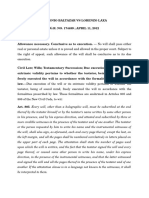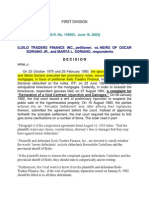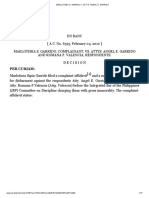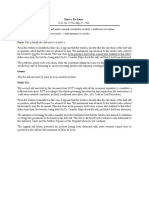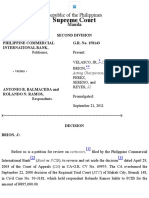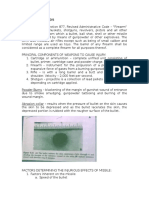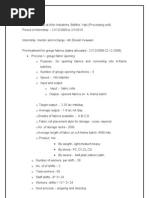Lim v. Chinco
Lim v. Chinco
Uploaded by
Alyanna ChangCopyright:
Available Formats
Lim v. Chinco
Lim v. Chinco
Uploaded by
Alyanna ChangOriginal Description:
Original Title
Copyright
Available Formats
Share this document
Did you find this document useful?
Is this content inappropriate?
Copyright:
Available Formats
Lim v. Chinco
Lim v. Chinco
Uploaded by
Alyanna ChangCopyright:
Available Formats
Estate of the deceased Victorina Villaranda. Eusebia Lim v.
Juliana Chinco
G.R. L- 33592, March 31, 1931
Facts
Deceased Victorina Villaranda y Diaz purportedly executed a will leaving her estate, consisting of properties
valued at P50, 000.00, more or less chiefly to her collateral relatives Eusebia, Crispina and Maria, all surname of
Lim.
The probate was opposed by Juliana Chinco, a full sister of the deceased.
It has been established that on the morning of 2 June 1929, the testator was stricken with apoplexy, incident to
cerebral hemorrhage, and was taken in an unconscious condition, seated in a chair, to her room. Upon
examining the patient, Doctor Geronimo Z. Gaanan, a local physician, found her insensible and incapable of
talking or controlling her movements. A certain Doctor Isidoro Lim, of Manila, was also called upon to visit the
patient and has come to see her two or three times. With his approval, it was decided to take the testator to the
hospital of San Juan de Dios in Manila, and on the morning of 5 June 1929, the ambulance from the hospital
arrived, in charge of Doctor Guillermo Lopez del Castillo, a resident physician of the hospital.
The purported will was prepared by Perfecto Gabriel, a practicing attorney of Manila, whose wife appears to be
related to the chief beneficiaries named in the will. Gabriel arrived upon the scene at 9 o'clock on the forenoon
of 5 June 1929. After informing himself of the condition of the testatrix, he went into a room adjacent to that
occupied by the patient and, taking a sheet from an exercise book, wrote the instrument in question. He then
took it into the sick room for execution. Gabriel suggested to Doctor Lopez del Castillo that he would be pleased
to have Doctor Castillo sign as a witness, but the latter excused himself for the reason that he considered the
old lady to be lacking in testamentary capacity. Another person present was Marcos Ira, a first cousin of the
deceased, and attorney Gabriel asked him also whether or not he was willing to sign as one of the witnesses. Ira
replied in a discouraging tone, and the
attorney turned away without pressing the matter. In the end three persons served as witnesses, all of whom
were in friendly relations with the lawyer, and two relatives of his wife. The intended testatrix was not able to
affix her signature to the document, and it was signed for her by the attorney.
Upon hearing, the trial court sustained the opposition and disallowed the will on the ground that the testatrix did
not have testamentary capacity at the time the instrument purports to have been executed.
Issue
Whether the supposed testatrix had testamentary capacity at the time the purported will was signed.
Held
No. The deceased did not possess testamentary capacity in executing her purported will.
The deceased, on the morning of June 5, 1929, was in a comatose condition and incapable of performing any
conscious and valid act. The patient was in a continuous state of coma during the entire period of her stay in
Meycauayan, subsequent to the attack, and that on the forenoon of 5 June 1929, she did not have sufficient
command of her faculties to enable her to do any valid act.
In order that a will executed by one person and signed by another on account of the testators inability to sign
may be deemed valid, the law requires that it shall have been signed under the express direction or the express
order of the testator. Such was wanting in the case at bar.
The judgment of the trial court was affirmed.
You might also like
- Constitutional Law ReviewerDocument93 pagesConstitutional Law ReviewerPopo Tolentino100% (30)
- Rockport Contract 2021Document58 pagesRockport Contract 2021api-306052019No ratings yet
- Psych by Ciccarelli Chapter 1Document4 pagesPsych by Ciccarelli Chapter 1Amica Dela CruzNo ratings yet
- Final Project Report of Base IsolationDocument14 pagesFinal Project Report of Base IsolationSantosh Yadav91% (11)
- 23 - Lim Vs Chinco (D)Document2 pages23 - Lim Vs Chinco (D)Angelic ArcherNo ratings yet
- Lim Vs ChincoDocument1 pageLim Vs ChincoUPDkathNo ratings yet
- Aldaba vs. RoqueDocument2 pagesAldaba vs. RoqueErmeline TampusNo ratings yet
- 21 Azuela Vs CA GDocument1 page21 Azuela Vs CA Ghaberallan211No ratings yet
- Tordilla Vs TordillaDocument2 pagesTordilla Vs TordillaNelia Mae S. VillenaNo ratings yet
- Vda de Bacaling vs. LagunaDocument11 pagesVda de Bacaling vs. LagunaAira Mae LayloNo ratings yet
- 14 - de Belen Vs Tabu (D)Document2 pages14 - de Belen Vs Tabu (D)Angelic ArcherNo ratings yet
- Paula Dela Cerna, Et. Al. vs. Potot, Et - Al.Document1 pagePaula Dela Cerna, Et. Al. vs. Potot, Et - Al.MhareyNo ratings yet
- Case 26 Torres Lopez de Bueno Vs LopezDocument1 pageCase 26 Torres Lopez de Bueno Vs LopezReyesJosellereyesNo ratings yet
- 15 - Abaya vs. ZalameroDocument1 page15 - Abaya vs. ZalameroflormtejNo ratings yet
- Alvarez V IACDocument2 pagesAlvarez V IACGertrude GamonnacNo ratings yet
- ABAYS Vs ZALAMERODocument1 pageABAYS Vs ZALAMEROMay ChanNo ratings yet
- Cuevas Vs CuevasDocument2 pagesCuevas Vs CuevasJohnde MartinezNo ratings yet
- FGU Vs GP SarmientoDocument2 pagesFGU Vs GP SarmientoKaira Marie Carlos0% (1)
- Araneta v. Philippine Sugar Estate Development Co., 20 SCRA 330 (1967)Document3 pagesAraneta v. Philippine Sugar Estate Development Co., 20 SCRA 330 (1967)Fides Damasco0% (1)
- Digest - Nuguid vs. NuguidDocument1 pageDigest - Nuguid vs. NuguidAnny YanongNo ratings yet
- Alvarado VS GaviolaDocument2 pagesAlvarado VS GaviolaFlexiWriters GlobalNo ratings yet
- Pagaduan V. Ocuma G.R. No. 176308 May 3, 2009Document2 pagesPagaduan V. Ocuma G.R. No. 176308 May 3, 2009jearnaezNo ratings yet
- Labrador vs. Court of AppealsDocument2 pagesLabrador vs. Court of AppealsAngelReaNo ratings yet
- Antonio Baltazar Vs Lorenzo LaxaDocument9 pagesAntonio Baltazar Vs Lorenzo LaxaSarah De GuzmanNo ratings yet
- Dantis Vs MAghinangDocument7 pagesDantis Vs MAghinangVince Llamazares LupangoNo ratings yet
- Q02 People V Del RosarioDocument2 pagesQ02 People V Del RosarioPhilip SuplicoNo ratings yet
- Succession: Chanrobles Law LibraryDocument4 pagesSuccession: Chanrobles Law LibraryChristine Rose Bonilla LikiganNo ratings yet
- GARCIA v. LACUESTADocument1 pageGARCIA v. LACUESTAMhareyNo ratings yet
- Sales Digest Busmente CasesDocument12 pagesSales Digest Busmente CasesYieMaghirangNo ratings yet
- Lee Vs TambagoDocument1 pageLee Vs TambagoRavenFox100% (1)
- Alvarado vs. Gaviola Jr.Document8 pagesAlvarado vs. Gaviola Jr.Dexter CircaNo ratings yet
- Samson vs. QuintinDocument2 pagesSamson vs. QuintinJoan Tan-CruzNo ratings yet
- Eds vs. HealthCheckDocument2 pagesEds vs. HealthCheckJosine ProtasioNo ratings yet
- Poltan v. BpiDocument13 pagesPoltan v. Bpircmj_supremo3193No ratings yet
- 41 Regner V LogartaDocument3 pages41 Regner V LogartaCedricNo ratings yet
- Goldstein V RocesDocument1 pageGoldstein V RocesRoseanne MateoNo ratings yet
- Case DigestDocument5 pagesCase DigestAlexylle Garsula de ConcepcionNo ratings yet
- 1 Spouses Raymundo V BandongDocument2 pages1 Spouses Raymundo V BandongseentherellaaaNo ratings yet
- Torres v. LopezDocument2 pagesTorres v. LopezKent A. AlonzoNo ratings yet
- Case Digest - Defective ContractsDocument2 pagesCase Digest - Defective ContractsVERONICA YVONNE SALVADORNo ratings yet
- Succession Digest 9-25-17Document23 pagesSuccession Digest 9-25-17Dustin NitroNo ratings yet
- Corpus-Pascual DigestDocument7 pagesCorpus-Pascual DigestIlham Usman BatuganNo ratings yet
- RCBC VS Hi Tri Development CorporationDocument3 pagesRCBC VS Hi Tri Development Corporationjo123No ratings yet
- Sanjorjo vs. Quijano DigestDocument2 pagesSanjorjo vs. Quijano DigestXyrus BucaoNo ratings yet
- Maelotisea S. Garrido v. Attys. Angel E. GarridoDocument17 pagesMaelotisea S. Garrido v. Attys. Angel E. Garridojake31No ratings yet
- Arcillas vs. Montejo FactsDocument1 pageArcillas vs. Montejo Factscarlo_tabangcuraNo ratings yet
- Producers Bank of The Phil Vs CA 115324 February 19, 2003Document2 pagesProducers Bank of The Phil Vs CA 115324 February 19, 2003Thoughts and More ThoughtsNo ratings yet
- Alsua Bets Vs CADocument6 pagesAlsua Bets Vs CALeo Balante Escalante Jr.No ratings yet
- 2 Barut v. CabacunganDocument9 pages2 Barut v. CabacunganReyar SenoNo ratings yet
- Diaz v. de LeonDocument1 pageDiaz v. de LeonAnjNo ratings yet
- Leticia Valmonte Ortega vs. ValmonteDocument1 pageLeticia Valmonte Ortega vs. ValmonteadrianmdelacruzNo ratings yet
- Gan Vs Yap Case DigestDocument3 pagesGan Vs Yap Case DigestdanielNo ratings yet
- Gonzales vs. CarungcongDocument2 pagesGonzales vs. CarungcongAndrea Nicole ParceNo ratings yet
- Vda De. Kilayko vs. Tengco 45425, MARCH 27, 1992: FactsDocument1 pageVda De. Kilayko vs. Tengco 45425, MARCH 27, 1992: FactsPaolo PacquiaoNo ratings yet
- Sugar Regulatory Administration vs. TormonDocument1 pageSugar Regulatory Administration vs. TormonMaria Florida ParaanNo ratings yet
- EquItable PCI Vs NG Sheung Ngor G.R. No. 17154 December 19, 2007Document6 pagesEquItable PCI Vs NG Sheung Ngor G.R. No. 17154 December 19, 2007MarkNo ratings yet
- Hacbang Vs AloDocument6 pagesHacbang Vs AloSachuzenNo ratings yet
- Discussion Chi Ming ChoiDocument4 pagesDiscussion Chi Ming ChoiravaneragrashelleNo ratings yet
- Case 1 BondadDocument3 pagesCase 1 BondadDanica CaballesNo ratings yet
- Docena V Lapesura DigestDocument1 pageDocena V Lapesura DigestYvette MoralesNo ratings yet
- 6 - Dionisio v. DionisioDocument1 page6 - Dionisio v. DionisioJasmine LeañoNo ratings yet
- 033 Intestate Estate of The Deceased Marcelo de BorjaDocument2 pages033 Intestate Estate of The Deceased Marcelo de BorjaKim Guevarra100% (1)
- Lim Vs ChincoDocument3 pagesLim Vs ChincoAlyanna ChangNo ratings yet
- LIM v. CHINGCODocument2 pagesLIM v. CHINGCONOLLIE CALISINGNo ratings yet
- PNB Vs FF CruzDocument8 pagesPNB Vs FF CruzAlyanna ChangNo ratings yet
- Republic of The Philippines: Supreme CourtDocument11 pagesRepublic of The Philippines: Supreme CourtAlyanna ChangNo ratings yet
- Supreme Court: Republic of The PhilippinesDocument19 pagesSupreme Court: Republic of The PhilippinesAlyanna ChangNo ratings yet
- Pals - Comm Law 2015Document14 pagesPals - Comm Law 2015code4saleNo ratings yet
- Citystate Savings Bank Vs TobiasDocument10 pagesCitystate Savings Bank Vs TobiasAlyanna ChangNo ratings yet
- CHAPTER 5-Stat ConDocument3 pagesCHAPTER 5-Stat ConAlyanna ChangNo ratings yet
- Forensic MedicineDocument5 pagesForensic MedicineAlyanna ChangNo ratings yet
- Pals Ethics 2015Document43 pagesPals Ethics 2015Law School FilesNo ratings yet
- Letter of Credit, PartiesDocument1 pageLetter of Credit, PartiesAlyanna ChangNo ratings yet
- Constitutional Safeguards On Judicial Independence: Submitted By: Group 1Document22 pagesConstitutional Safeguards On Judicial Independence: Submitted By: Group 1Alyanna ChangNo ratings yet
- Ty vs. Trampe G.R. NO. 117577, DEC. 1, 1995Document2 pagesTy vs. Trampe G.R. NO. 117577, DEC. 1, 1995Irene Quimson100% (1)
- PAL v. CADocument11 pagesPAL v. CAAlyanna ChangNo ratings yet
- International Exchange Bank V CIRDocument2 pagesInternational Exchange Bank V CIRAlyanna ChangNo ratings yet
- First Planters Pawnshop V CIRDocument1 pageFirst Planters Pawnshop V CIRAlyanna ChangNo ratings yet
- Summer Reviewer: A C B O 2007 Civil LawDocument46 pagesSummer Reviewer: A C B O 2007 Civil LawMiGay Tan-Pelaez90% (20)
- Election Law I. General PrinciplesDocument2 pagesElection Law I. General PrinciplesAlyanna ChangNo ratings yet
- Flowchart of Procedure Before The International Court of Justice (Merged)Document9 pagesFlowchart of Procedure Before The International Court of Justice (Merged)Alyanna Chang100% (1)
- Dison V PosadasDocument2 pagesDison V PosadasAlyanna ChangNo ratings yet
- Fitness Tracker App - Final - CoverDocument48 pagesFitness Tracker App - Final - Coversachin raj Cse d roll 24No ratings yet
- Immunization DR T V RaoDocument68 pagesImmunization DR T V Raotummalapalli venkateswara rao100% (1)
- Language Acquisition GuideDocument118 pagesLanguage Acquisition GuideFrank Fernández100% (1)
- EBook Infection Control and Management of Hazardous Materials For The Dental Team PDF Docx Kindle Full ChapterDocument62 pagesEBook Infection Control and Management of Hazardous Materials For The Dental Team PDF Docx Kindle Full Chaptermichael.carathers448100% (43)
- Textile Internship at Alok IndustriesDocument8 pagesTextile Internship at Alok Industriessaroj anandNo ratings yet
- Base Shear NSCP 2010Document54 pagesBase Shear NSCP 2010Jenesis de GuzmanNo ratings yet
- Environment Law Project 2Document17 pagesEnvironment Law Project 2Vicky DNo ratings yet
- Che On My Mind by Margaret RandallDocument20 pagesChe On My Mind by Margaret RandallDuke University PressNo ratings yet
- Kurikulum Matematika Di AustraliaDocument96 pagesKurikulum Matematika Di Australiafitri melaniNo ratings yet
- Tle CSS Module 5 - Terminating and Connecting Electrical Wiring and Electronic CircuitDocument21 pagesTle CSS Module 5 - Terminating and Connecting Electrical Wiring and Electronic CircuitCrauxz de TraxNo ratings yet
- Important Current Affairs Capsule March 2018 in PDF 2Document51 pagesImportant Current Affairs Capsule March 2018 in PDF 2Shivam DwivediNo ratings yet
- Risk Vs ReturnDocument38 pagesRisk Vs ReturnIndah ArisaqNo ratings yet
- Lanair XT 150 200 250 300 Operation ManualDocument60 pagesLanair XT 150 200 250 300 Operation ManualMaintenance SteelMartNo ratings yet
- Maher, Kristen Hill, and Megan Lafferty - White Migrant Masculinities in ThaiDocument23 pagesMaher, Kristen Hill, and Megan Lafferty - White Migrant Masculinities in ThaiFrançoisDeLaBellevieNo ratings yet
- Mayasheel Retail India Ltd. - UpdatedDocument32 pagesMayasheel Retail India Ltd. - UpdatedBhuvanesh RavichandranNo ratings yet
- All chapter download Solution Manual for Cognition, 6/E Mark H. Ashcraft Gabriel A. RadvanskyDocument39 pagesAll chapter download Solution Manual for Cognition, 6/E Mark H. Ashcraft Gabriel A. Radvanskylithinlinaki100% (2)
- RMHS E&I ScheduleDocument6 pagesRMHS E&I ScheduleanjnaNo ratings yet
- Class Seven, English First PaperDocument2 pagesClass Seven, English First PaperMuhammad RakibulislamNo ratings yet
- .AnomDocument2 pages.AnomMC CondéNo ratings yet
- 1000 Reasoning QuestDocument717 pages1000 Reasoning QuestSyed FurqanNo ratings yet
- Prelim ExamDocument8 pagesPrelim ExamTE O LONo ratings yet
- Canto 4Document87 pagesCanto 4Shivam AgrawalNo ratings yet
- Victorian PoetryDocument2 pagesVictorian PoetryOlivera BabicNo ratings yet
- Toy Biz 24 Exhibition Call for ApplicationDocument1 pageToy Biz 24 Exhibition Call for Applicationveera.deva.0110No ratings yet
- Mains Practice Question: ApproachDocument2 pagesMains Practice Question: ApproachGurcharan SinghNo ratings yet
- IJACADocument3 pagesIJACACS & ITNo ratings yet
- MljeDocument10 pagesMljeSalma salsabilaNo ratings yet























